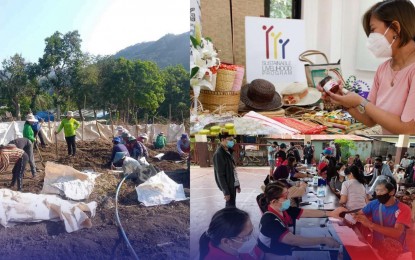
LIVELIHOOD PROGRAMS. The Department of Social Welfare and Development (DSWD) vows to continue to reinforce its various programs and services to help more Filipinos who need assistance, including those in crisis due to job loss. The Philippine Statistics Authority on Wednesday (May 8, 2024) reported an increase in unemployment rate from 3.5 percent in February to 3.9 percent in March. (DSWD photo)
MANILA – The Department of Social Welfare and Development (DSWD) on Wednesday said it will continue to reinforce its various programs and services that will help eligible Filipinos who are in need of assistance, including those in crisis due to job loss.
This, after the Philippine Statistics Authority (PSA) reported an increase in unemployment rate from 3.5 percent in February to 3.9 percent in March, particularly in agriculture due to El Niño phenomenon.
DSWD spokesperson and Assistant Secretary for Disaster Response Management Group (DRMG) Irene Dumlao said unemployed Filipinos may avail of DSWD programs and services, subject to the assessment of social workers and provided they meet the eligibility requirements.
“Through the various programs of the DSWD, we aim to help jobless Filipinos by capacitating them to strengthen their skills, competencies, and resources in accessing income-generating opportunities to help improve their socio-economic well-being,” Dumlao said in a news release.
Sustainable Livelihood Program
Dumlao said unemployed individuals may participate in the Sustainable Livelihood Program (SLP) of the DSWD.
SLP is a capacity-building program for the identified poor, vulnerable, and marginalized households and communities aimed at providing viable interventions and support to improve the participants’ socio-economic conditions by accessing and acquiring necessary assets to engage in and maintain thriving livelihoods.
“Under the SLP, beneficiaries are given the option to take either the micro-enterprise development track, which supports microenterprises to become organizationally and economically viable, or the employment facilitation track, which assists Filipinos to access appropriate employment opportunities,” she said.
SLP beneficiaries will receive seed capital fund (SCF), cash-for-building-livelihood-assets fund (CBLAF), skills training fund (STF), or employment-assistance fund (EAF).
“The SCF is a start-up capital for the purchase of small tools, raw materials, common service facilities, and other assets needed in starting or expanding a micro-enterprise while CBLAF is implemented through labor-intensive projects executed by program participants to build, re-build, and/or protect natural and physical assets necessary for more profitable, self-sustaining, and resilient micro-enterprises,” Dumlao said.
Dumlao said the STF is a capacity-building assistance for the acquisition of technical and vocational knowledge and skills delivered in the form of orientations and lectures, demonstrations, life skills training, and other similar skills application methodologies.
“The EAF, on the other hand, is a grant to acquire employment requirements such as but not limited to legal documents, medical exams, licenses, uniforms, and tools, as well as meals, lodging, and/or transportation allowance for the first fifteen days of guaranteed employment,” Dumlao said.
Among those eligible for SLP assistance are members of the Pantawid Pamilyang Pilipino Program (4Ps) and households who are poor, vulnerable and marginalized identified through the agency’s National Household Targeting System for Poverty Reduction (NHTS-PR).
Project LAWA and BINHI
Apart from livelihood and employment facilitation services, the DSWD is providing cash-for-training (CFT) and cash-for-work (CFW) through the agency’s Project LAWA (Local Adaptation to Water Access) and BINHI (Breaking Insufficiency through Nutritious Harvest for the Impoverished).
The project aims to strengthen the adaptive capabilities of the impoverished and vulnerable families in addressing the challenges during periods of severe drought. It focuses on mitigating the impact of food insecurity and water scarcity brought about by the El Niño phenomenon.
“The DSWD will provide each partner-beneficiary with the daily minimum regional wage rate of PHP470 in exchange for their attendance to the training and participation in the implementation of the projects in their respective barangays,” Dumlao said.
Assistance to Individuals in Crisis Situation
Through the Assistance to Individuals in Crisis Situation (AICS), the DSWD may provide food and cash aid, apart from the medical, educational and other aid, to individuals who are in crisis due to job loss.
Dumlao reiterated that the provision of AICS is subject to the assessment of DSWD social workers.
AICS is a social safety net or a stop-gap mechanism to support the recovery of individuals and families from unexpected crises such as illness or death of a family member, natural and man-made disasters, and other crisis situations. (PNA)
